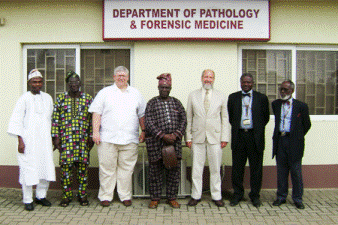Natural Resources, School of

Karl Reinhard Publications
Document Type
Article
Date of this Version
12-2019
Citation
Korean J Parasitol Vol. 57, No. 6: 565-566, December 2019
https://doi.org/10.3347/kjp.2019.57.6.565
Abstract
Archaeoparasitological research has rapidly developed in recent years, entering a new stage of improved understanding of our ancestors’ parasitic infections across the world. This progress is based on a variety of recently developed research techniques. During a period of rapid innovation since 2016, there has been no much opportunity for parasitologists to gather and share in-depth views about this novel research field. This was remedied by the 14th International Congress of Parasitology (ICOPA) held in Korea (Aug. 19-24, 2018; EXCO, Daegu). For archaeoparasitologists, ICOPA provided a unique opportunity to gather and exchange research and ideas. The participation was unprecedented in numbers of attendees and diversity of papers presented. Three sessions were organized under the unified theme of “A global perspective on ancient parasites: current research projects”. In the sessions, a number of landmark studies were presented by parasitologists, archaeologists, and paleopathologists from South Korea as well as many other countries worldwide. During the last decades, the summaries of significant advances in theory and method have periodically appeared in different journal special issues dedicated to archaeoparasitology [1-3]. The case studies from these issues improved our understanding of the history of parasites and the diversity of parasite populations over time. However, since most recently, research expanded geographically as well as methodologically, now is a fitting time to update the field in a new, dedicated volume. Therefore, to commemorate the event of ICOPA in Korea, and to present some of the most informed trends in archaeoparasitology, we planned the publication of a special issue under the title "A global perspective on ancient parasites and current research projects."
Included in
Archaeological Anthropology Commons, Ecology and Evolutionary Biology Commons, Environmental Public Health Commons, Other Public Health Commons, Parasitology Commons


Comments
© 2019, Korean Society for Parasitology and Tropical Medicine This is an Open Access article distributed under the terms of the Creative Commons Attribution Non-Commercial License